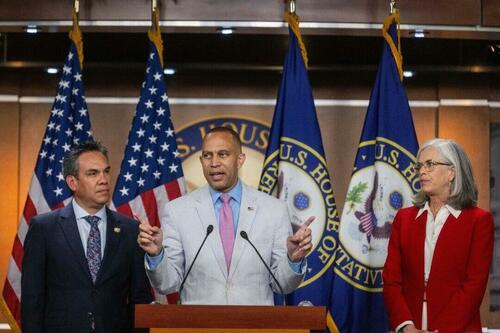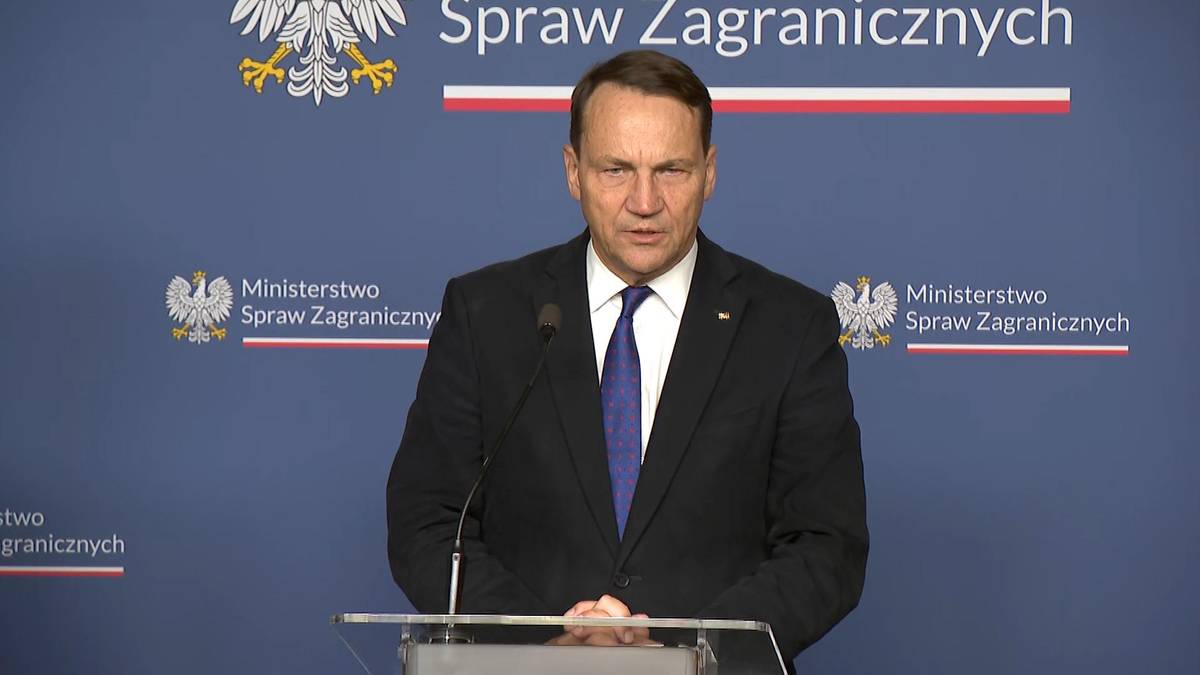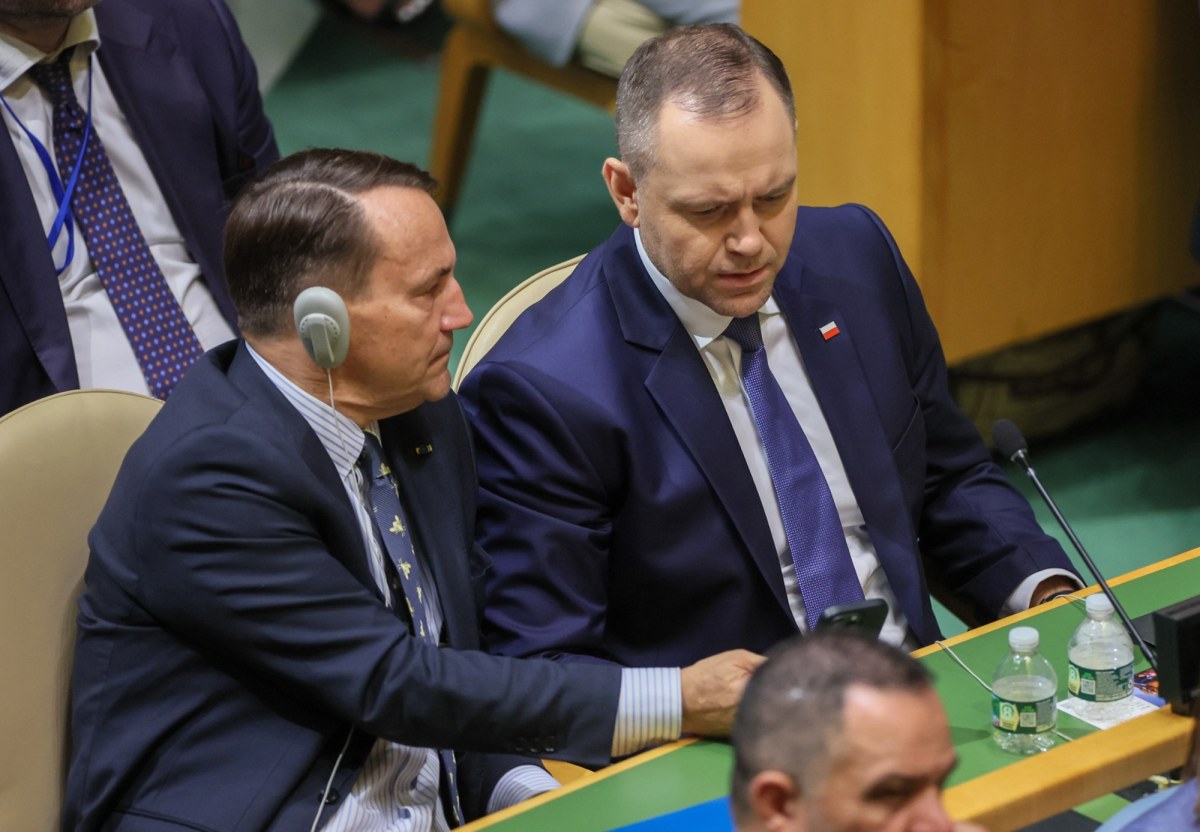
Democrats Plan August Blitz To Campaign Against GOP Spending Bill
Authored by Chase Smith via The Epoch Times (emphasis ours),
House Democratic leaders plan to use the August recess to launch a nationwide campaign against the Republican-led budget law signed by President Donald Trump earlier this month—an effort they say will define the lead-up to the 2026 midterms.
 House Minority Leader Hakeem Jeffries (C) of New York, flanked by Chair of the House Democratic Caucus Pete Aguilar of California and Democratic Whip Katherine Clark of Massachusetts, speaks at a Capitol Hill press conference on July 23, 2025. Jim Watson/AFP via Getty Images
House Minority Leader Hakeem Jeffries (C) of New York, flanked by Chair of the House Democratic Caucus Pete Aguilar of California and Democratic Whip Katherine Clark of Massachusetts, speaks at a Capitol Hill press conference on July 23, 2025. Jim Watson/AFP via Getty Images“The one big, ugly bill is deeply unpopular,” House Minority Leader Hakeem Jeffries (D-N.Y.) said during a press conference July 22, using the Democrats’ name for the bill, officially titled the One Big Beautiful Bill Act by its GOP sponsors. “Donald Trump is deeply unpopular. And House Republicans haven’t done a damn thing to make life more affordable for the American people.”
Public opinion has been mixed. In a poll released on July 15 by CNN/SSRS, 61 percent of respondents said they oppose the legislation. Regarding its economic impact, 51 percent said it would hurt the economy, while 29 percent said it would help.
Jeffries, joined by Whip Katherine Clark (D-Mass.) and Caucus Chair Pete Aguilar (D-Calif.), said Democrats will hold town halls and public events throughout the recess to highlight what they describe as the harmful effects of the spending package. Democrats have already made clear they will make the bill a centerpiece of their midterm strategy, warning it could lead to layoffs, benefit cuts, and rising costs for working families.
The legislation passed the House and Senate this month and was signed by Trump. Republicans say it streamlines government and boosts growth. The sweeping measure includes deep cuts to Medicaid, restructuring of safety net programs, and tax reductions that GOP leaders say will stimulate economic growth.
But Democrats say it will do the opposite.
“Hospitals will close. Nursing homes will shut down. Community-based health clinics will be unable to operate,” Jeffries added in the press conference.
Clark, speaking after Jeffries, accused Republicans of prioritizing the wealthy while undermining families.
“Their signature bill, the big, ugly bill, kicked 15 million Americans off their health insurance, takes food from 16 million kids, raises energy bills, shuts down hospitals, denies veterans their benefits,” she said. “They run up the debt to give tax breaks to billionaires.”
According to the nonpartisan Congressional Budget Office, the bill’s Medicaid provisions are expected to increase the number of uninsured Americans by 7.7 million, something Republicans have disputed.
The changes include new requirements for all enrollees to verify income and citizenship every six months starting in 2027. The bill also imposes a work or community engagement requirement of 20 hours per week for certain adults, effective no sooner than January 2027. States will also be allowed to impose cost-sharing of up to $35 per visit on some Medicaid expansion enrollees starting in 2028.
Republicans have argued these changes will improve program integrity. “[The bill] requires citizenship verification and more frequent eligibility checks in order to ensure illegal immigrants and ineligible beneficiaries are not able to receive Medicaid,” Rep. Tom Cole (R-Okla.) said in May. But some health policy analysts warn the new requirements could cause eligible Americans to lose coverage due to administrative hurdles.
House Democrats say they will contrast the Republican law with their own vision of an “affordable economy,” pointing to upcoming themed events, including a Medicare and Medicaid Day of Action on July 30, a Social Security-focused day on Aug. 14, and a Cost of Living Week of Action later that month.
“We believe in this country that when you work hard and play by the rules, you should be able to live the good life,” Jeffries said. “That means Republicans need to keep their hands off of Social Security and Medicare.”
Aguilar said the new law’s Medicaid cuts are already forcing rural hospitals to shut down. “They’re closing nursing homes, forcing grandma and grandpa to fend for themselves while making the purchase of a new private jet fully tax deductible,” he said.
The bill also reduces a financing tool used by nearly every state to boost federal Medicaid reimbursements. By phasing down allowable provider taxes from 6 percent to 3.5 percent in expansion states over five years, some Republicans say they are ending a form of “money laundering,” but critics warn the move could threaten hospital budgets.
To offset potential losses, the bill creates a $50 billion Rural Hospital Stabilization Fund, with funds available from 2026 through 2030.
Jeffries spoke for nearly nine hours on the House floor on July 2 in an attempt to delay the bill’s passage. Democrats have said the bill could raise health insurance premiums for middle-class families and reduce access to care, especially in expansion states.
Despite Democrats’ criticism, House Republican leaders praised the bill as a generational win. In a statement after its passage, GOP leadership said the law “permanently lowers taxes,” “unleashes American energy dominance,” and “makes government more efficient and effective.”
But Democrats said voters will reject those claims once they see the effects firsthand.
“They are literally running away from the needs of the American people in order to protect the very wealthy,” Clark said Wednesday.
Lawrence Wilson contributed to this report.
Tyler Durden
Thu, 07/24/2025 – 16:20
















